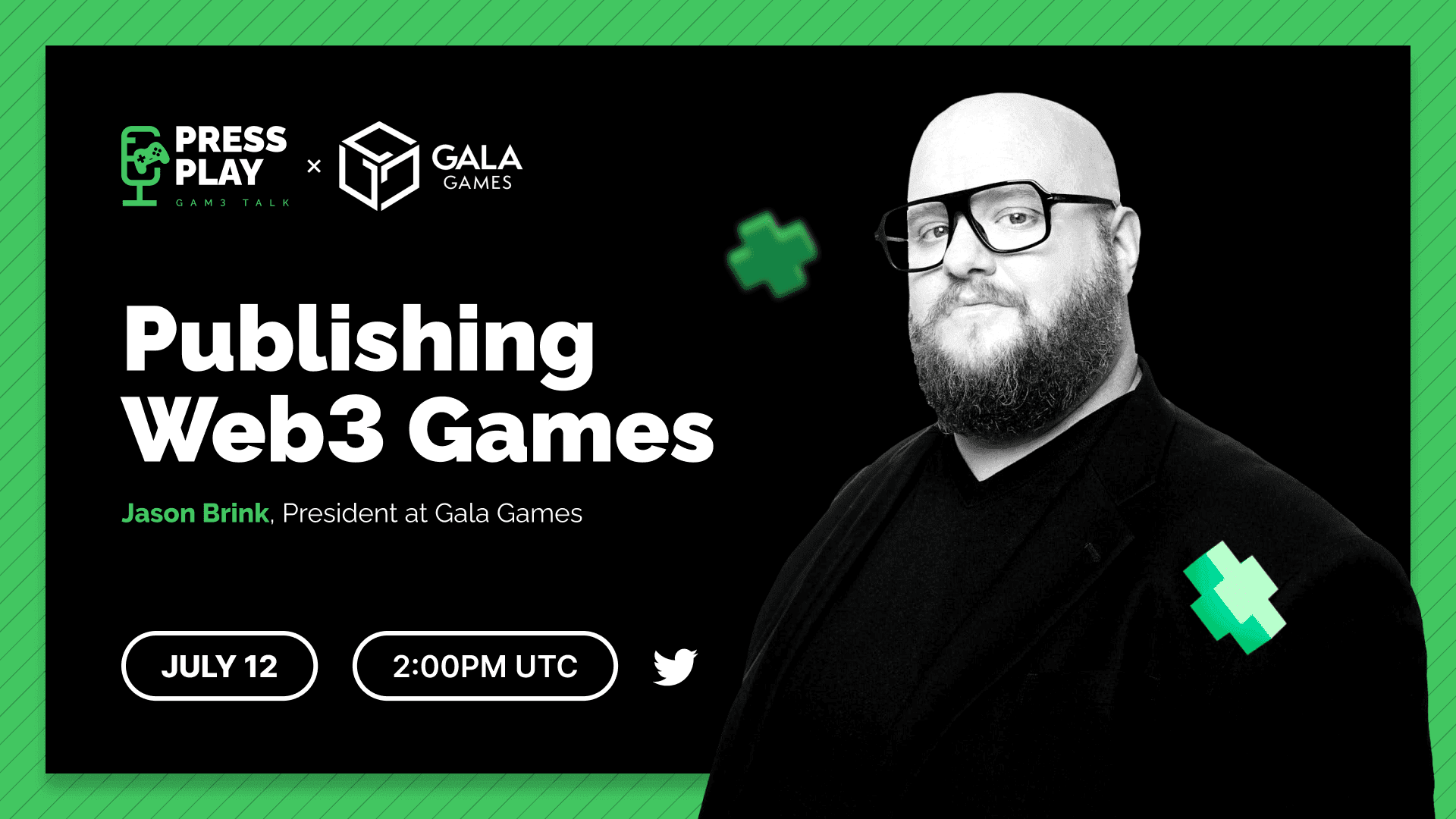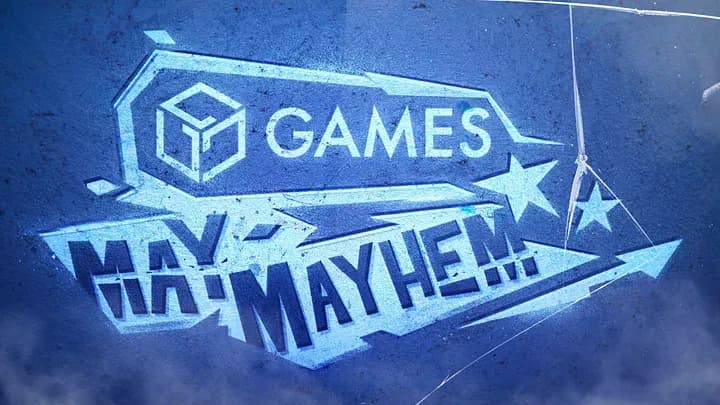In a recent exclusive interview on our Press Play Podcast, we sat down with Jason Brink an entrepreneur, blockchain theorist, and avid gamer. Jason is currently the President of Blockchain for Gala Games, one of the world's leading gaming platforms with web3 integration. Known in the web3 community as “BitBender,” Jason is a prominent individual in blockchain. Most notably he won the Bill and Melinda Gates Foundation Global Development Network Prize in 2014. In this article, we dive into the world of web3 gaming and Gala Games' significant role within it.

Jason began by acknowledging Gala Games' remarkable growth over the past decade. The company boasts a diverse portfolio of web3 games, encompassing over 50 titles and forging key partnerships with renowned studios. These titles now span a wide range of genres, extending their appeal far beyond the traditional gaming landscape.
We have a massive ecosystem with about 50 different games coming to market, focusing on high-end double and triple-A games made by fantastic people you've heard of, including those from Halo and Halo Infinite, Call of Duty, and even the original creator of Farmville, Mark Skaggs.
Gala Games is an organization focused on ownership. They believe in a future where gamers and developers can work together with new economic structures and incentives that aren't the same old broken systems the industry has dealt with forever. Jason says that the world of gaming started as something independent and beautiful but has more recently become groups of giant publicly-listed companies, filled with selling things people don't necessarily want to buy from people they don't want to buy it from. Jason believes there's a way, through blockchain technology and ownership concepts like "play to earn" or "play to own," to create new economic structures that incentivize different developers to build different types of games.
It's not always about having the largest triple-A game; it's about creating something that engages and serves a specific player base while being fun and focused on ownership.
Jason discusses the considerable success of some of their hit games such as Town Star, Champions Area, Spider Tanks, Superior, The Walking Dead, and more. These are just some of the many games that play an integral part of Gala Games' gaming ecosystem. Jason goes on to highlight how each of the games boasts unique gameplay, which transcends traditional gaming paradigms, drawing players into a decentralized, player-centric ecosystem. Moving forward, Jason says that Gala Games is committed to enhancing the gaming experience for players by implementing server-authoritative gameplay improvements for all of their games. These measures are designed to maintain high standards of performance, gameplay security, and integrity.

The discussion veered toward Gala Games' vision of transforming the gaming industry, leveraging web3 technology to usher in the era of "play to earn" and "play to own" gaming experiences. The emphasis was on moving beyond the traditional, centralized model to one that empowers players and redefines their roles within the gaming ecosystem.
Jason provided insights into Gala Games' collaborative efforts with various outsourced game development studios. These partnerships encompass both in-house and external studios, all of which are adapting to a web3 mindset that incorporates blockchain technology. The collaborative approach underpins the studio's continued growth and innovation in the web3 gaming sphere.
Right now, we're primarily working with web2 developers who are interested in entering the web3 space or experimenting with it. When working with external developers who are fundamentally web2 developers, it can be challenging because the web3 space doesn't always align with their standard web2 business models. There's a learning curve for developers to fully grasp web3 and ownership concepts.
One key element of web3 gaming discussed was the role of secondary tokens, such as Silk in Spider Tanks, in enhancing player engagement and in-game asset improvement. Jason shared Gala Games' strategy for managing these tokens, ensuring a balance that encourages continued gameplay while also supporting developers.
Silk is built into the game in such a way that you're incentivized to engage in the primary core loop of the game. You could show up, play Spider Tanks for free, borrow someone else's tank, you know, go kick ass, take names, it's awesome, and all of that. and you can get yourself some Silk. You are then incentivized to put that Silk back into that ecosystem to upgrade your tank to buy components and things of that nature so that you end up with a better NFT tank over time.
The conversation then shifted towards the Gala Node Network, a critical component of Gala Games' ecosystem. Jason highlighted the network's versatility and potential applications beyond gaming, suggesting it could play a more prominent role in various sectors. Their portfolio includes Gala Games, Gala Films, and Gala Music.
The Gala Network is supported by users, just like you, who operate Gala Nodes from their home computers. By buying a license to operate a Gala Node, you open up opportunities to receive rewards for your contribution to the network. This can include GALA, limited edition NFTs, and opportunities to help the Gala Games ecosystem grow.
Quality control emerged as a crucial aspect of Gala Games' operation, with the studio committed to maintaining high standards and ensuring a top-tier gaming experience for players. The path to decentralization in web3 gaming was another significant theme. Jason discussed the challenges and considerations involved in transitioning to a more decentralized model while effectively managing player expectations.
It's true that there can be a significant gap between reality and expectations in the world of web3, especially in the context of blockchain-based games and projects.
Jason says this is a result of several factors, including:
Unrealistic Expectations: Many people have high expectations for web3 projects, expecting rapid development and immediate results. They might not fully understand the complexity and time it takes to create a quality product.
Transparency and Hype: Web3 projects often emphasize transparency and community engagement. They frequently share development progress and updates, which can create hype and raise expectations. When deadlines aren't met, some community members may cry "rug pull" or express frustration.
Development Challenges: Building web3 games or decentralized applications can be technically challenging. The technology is relatively new, and there are often unforeseen obstacles that can slow down development.
Market Pressure: The cryptocurrency market is highly speculative and volatile. Some projects feel pressure to release products quickly to capitalize on market momentum, which may not be the best approach for creating a sustainable and secure product.
Lack of Understanding: Some users may not fully understand the development process, the challenges developers face, or the need for extensive testing and security measures. They may not appreciate the time and effort required to create a robust product.
Managing these gaps between expectation and reality in the web3 space requires effective communication from project teams, setting realistic expectations, and educating the community about the complexities involved. It's important for both developers and users to have patience and a long-term perspective when it comes to web3 projects.
Final Thoughts
Our exclusive conversation with Jason Brink has provided invaluable insights into the realm of web3 gaming and Gala Games' prominent role within it. As Gala Games continues to expand its portfolio, embrace decentralized gaming experiences, and strengthen quality control, it becomes evident that their commitment to reshaping the gaming industry is unwavering. With the support of a vibrant community and a clear vision for the future, Gala Games stands at the forefront of a transformative era in gaming. Watch out for more groundbreaking developments and innovations as they forge ahead in the exciting world of web3 gaming.




